OWS: What Can the Global Occupy Movement Learn from Egypt?

NEWS JUNKIE POST
Nov 21, 2011 at 4:06 pm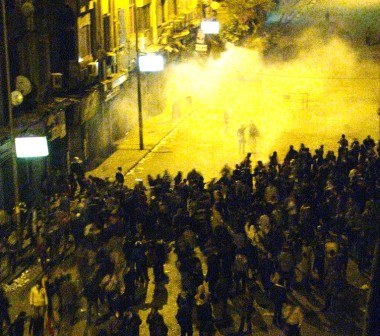 Revolutions are complex phenomenons which do not follow linear or predictable courses. The 1789 French revolution went through many phases encompassing its hardening and journey towards collective psychosis once Robespierre took control during the brutal phase known as the Terror. During this period of madness, so many heads were getting cut off by summary Guillotine executions that many credible stories asserted that the Seine river became red from the blood spilled.
Revolutions are complex phenomenons which do not follow linear or predictable courses. The 1789 French revolution went through many phases encompassing its hardening and journey towards collective psychosis once Robespierre took control during the brutal phase known as the Terror. During this period of madness, so many heads were getting cut off by summary Guillotine executions that many credible stories asserted that the Seine river became red from the blood spilled.
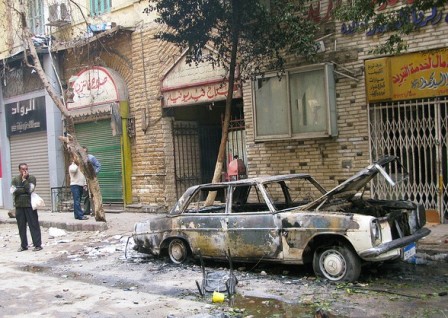 This unstable time was eventually “pacified” when General Bonaparte firmly took control of the power apparatus. The 1917 Russian revolution also had complex phases with internal struggles between the key leaders. The idealist Trotsky lost the battle, and his life, allowing Stalin to take over and impose his brutal dictatorship on all the citizens of the Soviet Union.
This unstable time was eventually “pacified” when General Bonaparte firmly took control of the power apparatus. The 1917 Russian revolution also had complex phases with internal struggles between the key leaders. The idealist Trotsky lost the battle, and his life, allowing Stalin to take over and impose his brutal dictatorship on all the citizens of the Soviet Union.
The revolution in Egypt is currently going though a similar turmoil. While last spring protests got rid off Mubarak and his corrupt and often brutal regime, it has left the army in charge. But now the protesters want the army out of power, and the Egyptian army is fighting back. In Tahrir Square, in the past few days, more than 24 people have been reported killed. Despite the call, made on Sunday, by almost all the civilian parties, for an end of the military rule before the drafting of a new constitution, the army is brutally cracking down on demonstrators. According to many credible news sources, it has been reported that the Egyptian army is using live ammunition.
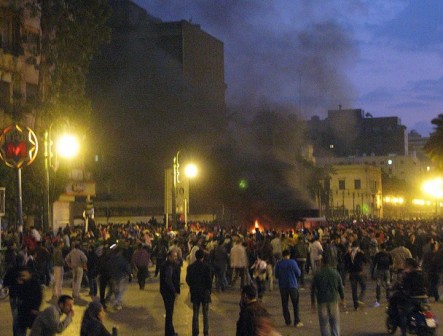 The massive protests are not limited to Cairo and Tahrir Square. On Sunday, the clashes opposing the protesters and police or military forces had spread to seven other cities including major towns like Suez and Alexandria. More than 1,000 have already been seriously injured. Mr. ElBaradei, a likely presidential contender, is urging for a “national unity” new government including representatives of all parties from liberal parties to the Muslim Brotherhood.
The massive protests are not limited to Cairo and Tahrir Square. On Sunday, the clashes opposing the protesters and police or military forces had spread to seven other cities including major towns like Suez and Alexandria. More than 1,000 have already been seriously injured. Mr. ElBaradei, a likely presidential contender, is urging for a “national unity” new government including representatives of all parties from liberal parties to the Muslim Brotherhood.
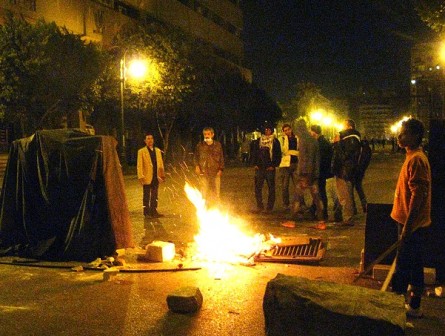 On Sunday night, in a television interview, ElBaradei stressed the seriousness of the situation arguing that the military led cabinet was not qualified. “It would have been more honorable for the cabinet to say the state has failed and to leave for others to manage the country. This is not a crisis, the country is falling apart,” said ElBaradei. Regardless of what will be the role, if any, of ElBaradei in Egyptian affairs, Egypt’s revolution has entered a brutal and bloody phase.
On Sunday night, in a television interview, ElBaradei stressed the seriousness of the situation arguing that the military led cabinet was not qualified. “It would have been more honorable for the cabinet to say the state has failed and to leave for others to manage the country. This is not a crisis, the country is falling apart,” said ElBaradei. Regardless of what will be the role, if any, of ElBaradei in Egyptian affairs, Egypt’s revolution has entered a brutal and bloody phase.
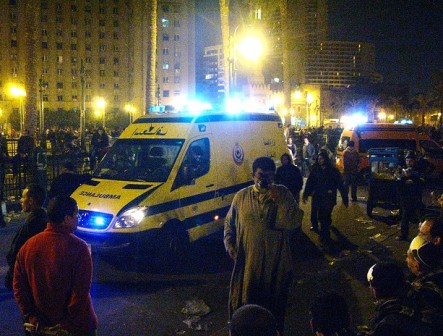 With protests percolating all over the world inspired by the Egyptian revolution, the global OWS ( Occupy Wall Street) or occupy movement should learn a few valuable lessons from the events unfolding in Egypt. In European countries, such as Greece and Italy, some of the protests and the repression of it by the police are becoming violent. In the United States, the OWS movement is facing increasing police brutality. So far the actions from the OWS movement have been peaceful. But, could we be getting closer to a breaking point proportionate to police brutality or will the US movement stick to its core and admirable value of being non-violent? In other words, can a revolution stay non-violent or does blood always has to be spilled at some stages of the process?
With protests percolating all over the world inspired by the Egyptian revolution, the global OWS ( Occupy Wall Street) or occupy movement should learn a few valuable lessons from the events unfolding in Egypt. In European countries, such as Greece and Italy, some of the protests and the repression of it by the police are becoming violent. In the United States, the OWS movement is facing increasing police brutality. So far the actions from the OWS movement have been peaceful. But, could we be getting closer to a breaking point proportionate to police brutality or will the US movement stick to its core and admirable value of being non-violent? In other words, can a revolution stay non-violent or does blood always has to be spilled at some stages of the process?
Editor’s Note: All photographs by Tori Aarseth .
Related Articles
- December 3, 2011 My Thoughts on Occupy
- November 23, 2012 Occupy Strategy: Global Strike and Consumer Boycott Should Be on the Agenda
- December 17, 2011 Growing Pains: When Hate and Exclusion Occupy
- December 14, 2011 Occupy Movement: Phase Two
- December 3, 2011 Unions Back Keystone XL Pipeline Threatens Clash With Occupy Movement
- December 4, 2011 Occupy DC: Police Clear Camp Making Way for Van Jones












5 Responses to OWS: What Can the Global Occupy Movement Learn from Egypt?
You must be logged in to post a comment Login